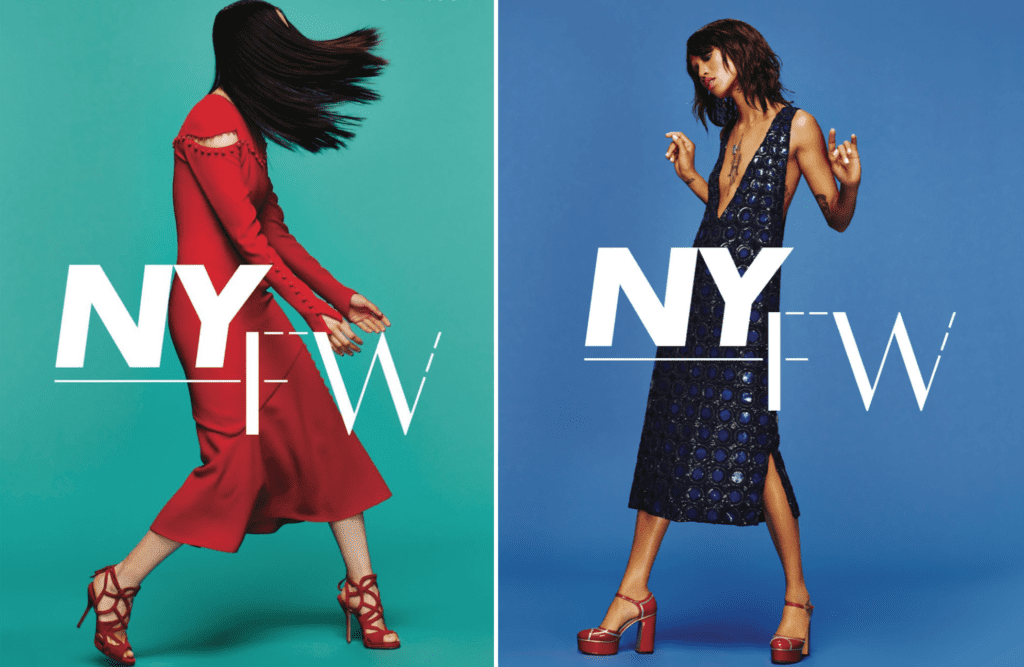The schedule for February’s New York Fashion Week is here, with producer/organizer team IMG Worldwide and the Council of Fashion Designers of America (“CFDA”) setting out the 71 fashion brands – from the most promising young(ish) names like Monse, Khaite, and Sies Marjan to established powerhouses, such as Tom Ford, Oscar de la Renta, and Marc Jacobs – that will send their newest collections down the runway as part of the week’s official events beginning on February 2. But as the run up to the Fall/Winter 2020 womenswear shows comes into full-swing, so too, does an ugly fight over the bi-annual week, itself.
For a half-a-decade, as New York-based designers have routinely showed their seasonal wares on a twice-per-year basis as part of the New York Fashion Week festivities, an escalating battle over the rights to the “New York Fashion Week” name has been underway, pitting reigning NYFW powers-that-be IMG and the CFDA against Fashion Week, Inc. (“FWI”), an unrelated company in the business of hosting consumer-facing fashion shows, which it says are distinct from the industry-only nature of the official NYFW events.
The latest round of parties’ multi-year clash takes the form of a lawsuit that IMG filed against FWI in December, in which the events and talent management company accused its much-smaller rival of attempting to “cash in on years of goodwill and publicity related to the NYFW events that it has never had anything to do with,” and to “confuse consumers into believing that [it] … is affiliated with the famous New York Fashion Week events and IMG” by aggressively filing for and using fashion week-related marks in connection with its own events, which it holds during every February and September NYFW.
On the heels of IMG filing its trademark infringement and dilution, and unfair competition lawsuit late last year, FWI has lodged a strongly-worded response with the court this month, denying most of IMG’s claims – which it calls “false and defamatory in nature” – and asserting a number of defenses and four counterclaims of its own.
In its 44-page answer, FWI argues that despite IMG’s claims to the contrary, it is not causing “consumer deception or confusion” as a result of its use of a number of trademarks (for which it has received registrations) – including NYFW and New York Fashion Week – in connection with the events it holds during NYFW, including fashion shows.
In reality, the 6-year old company asserts that if there is any confusion amongst consumers as to the source/nature of its offerings and events, that confusion “has been caused by [IMG’s] wrongful use of [FWI’s] trademarks,” and not the other way around. As it turns out, FWI actually beat IMG and the CFDA to the punch in filing and receiving registrations from the U.S. Patent and Trademark Office (“USPTO”) for a number of NYFW-related marks. Additionally, FWI claims that it began using the “New York Fashion Week” and NYFW marks long before IMG because “IMG’s shows were called ‘Mercedes Benz Fashion Week’ and ‘MBFW’ for a decade until 2015, [at which point] FWI’s marks were already in use.”
(The date of first use is significant, as in the U.S., trademark rights are earned by being the first party to actually use a trademark, not by being the party to register the mark with the USPTO.)
FWI is not merely amassing trademark registrations, though. IMG claims that the company is doing so in order to sell them to IMG in exchange for a hefty price, or as IMG puts it, FWI is “attempting to traffic in trademarks for profit” by offering to sell it all of its “trademarks” and “rights,” and to “transfer [its own event] sponsors” to IMG, but at the same time, allegedly “threatening litigation, delay, and bad press if IMG did not acquiesce to [its] demands” in connection with such a sale. (FWI denies this.)
Aside from merely denying IMG’s claims, FWI sets out a handful of defenses, arguing that it has been using NYFW-related trademarks “since 2013 without any challenge by [IMG] until December of 2019,” which it says is “well beyond any applicable [statute of] limitations period,” thereby, barring IMG’s claims. In addition to timing issues, FWI argues that IMG’s lawsuit and the remedies it is seeking are precluded because of its own alleged bad acts, namely, its attempts to “misappropriate the name of an event” and engage in the “antitrust monopolizing of generic terms.”
According to FWI, an “event” – such as NYFW – “is not a trademark”,” (i.e., any word, name, symbol, device, or any combination, used or intended to be used to identify and distinguish the goods/services of one company from those of others), “nor can it be, due to the generic nature of the term.”
Based on the “generic nature” of the New York Fashion Week name (aka the general use of the NYFW name to refer to a category of events from an array of companies as opposed to the services of one particular company), FWI claims – in an argument against IMG but also against itself since it maintains NYFW-specific trademark registrations – that IMG’s “misappropriated [New York Fashion Week] trademark is too weak to afford it any protection of any kind.”
Still yet, FWI sets out a number of causes of action of its own against IMG, including federal and common law trademark infringement, and unfair competition on that basis that “IMG not only misappropriated the FWI trademarks for its own purpose” and “misappropriated the labors and expenditures of FWI,” but it “did so with the intent of harming FWI and forcing it out of business in order to eliminate any competition in the fashion industry.”
As a result, FWI says that it “has been damaged and has suffered, or will suffer, losses in an amount to be determined at time of trial, but is no less than $5,000,000.00.”
*The case is IMG Worldwide, LLC and International Merchandising Company, LLC, v. Fashion Week, Inc., 1:19-cv-11225 (SDNY).











